Last time we reviewed six unitarian Bible translations, covering some basic information about where each came from and their overall strategy for translation. Today, we’re going to analyze how they translate three key texts, including Philippians 2.6, John 1.1-3, and John 8.58. Our goal is to measure these translations against what the Greek says as well as noting significant variations from mainstream translations and each other.
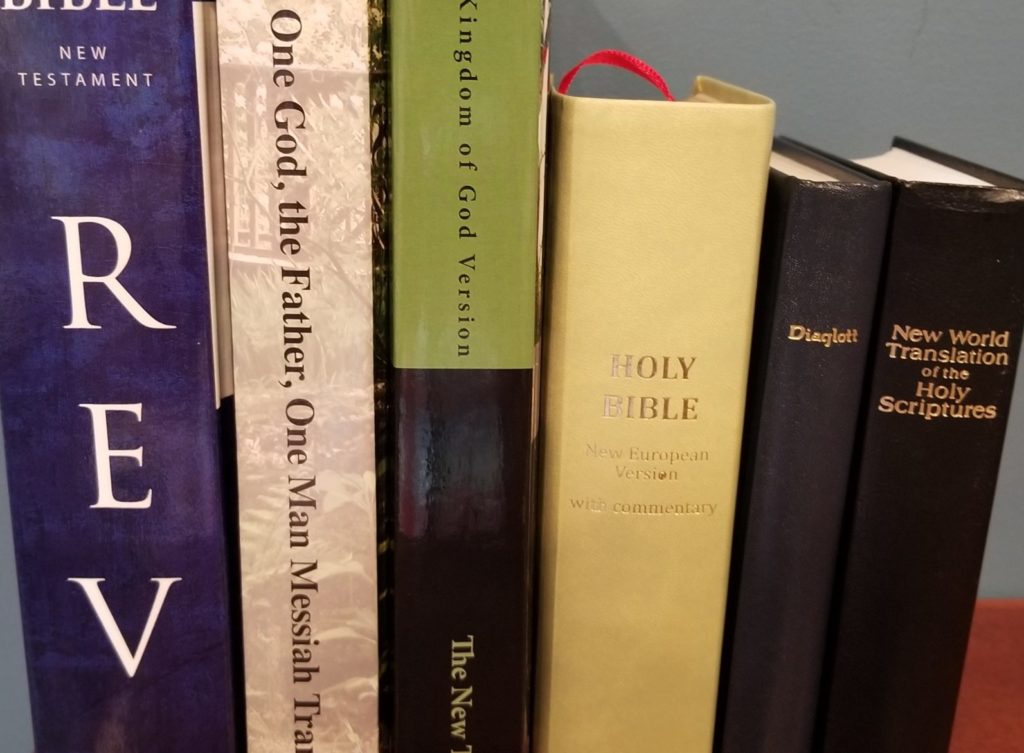
—— Links ——
- Check out these other episodes with Jerry Wierwille
- For previous episodes that cover these verses in greater detail see God’s Form or God’s Nature (Translating Philippians 2.6-7) and Did Jesus Claim to Be the I AM? (Translating John 8.58)
- For John 1, see Dale Tuggy’s “Trinities” podcast episode 290: Is the “Socinian” interpretation of John 1 correct?
- For my class on How We Got the Bible, half of which covered translation issues, follow this link.
- If you’d like to support Restitutio, you can donate here.
- Intro music: Good Vibes by MBB Attribution-ShareAlike 3.0 Unported (CC BY-SA 3.0) Free Download / Stream: Music promoted by Audio Library

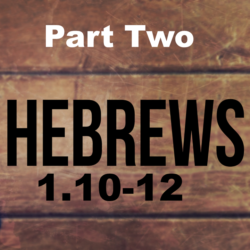
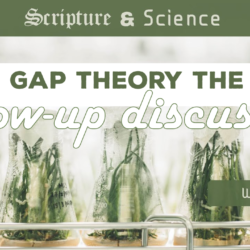
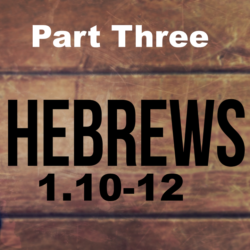
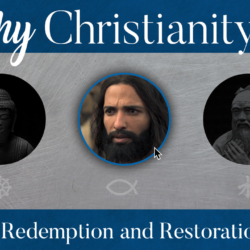


Sean, Jerry, thanks again for all your work. I’ve sighted the ED bible in a couple of articles and I use the REV almost daily. I grew up JW, so i have a few NWT on my shelf. I do wish the William newcome translation would have had some representation among the Unitarian bible translations, although it’s honestly not super impressive. The NWT has an impressive OT, even being one of the few bibles to emphasize the tiqqun sopherim, however, as a whole, I’m not much of a fan of its NT. Really enjoying these podcasts, keep up the good work. Btw, if you’re looking for a 2013 edition of the NWT still, https://www.amazon.com/dp/B06VV93ZNN/ref=cm_sw_r_cp_apa_i_PnPuFbYJMD84T this is one. I was still a witness when this was released, I remember the announcement. The study bible on JW.org might still be the previous version. They had a study bible before the 2013 revision, and to my knowledge, the study bible of the 2013 revision has not been released yet but this was as of last year i think.
Comment for Devon, et al :
‘The New Testament in an Improved Version’ of 1808, produced by a committee of Unitarians led by Thomas Belsham, was a revision of Archbishops William Newcombe’s 1794, ‘Unitarian congenial’, New Testament. It is available online at :
https://archive.org/details/newtestamentinim00newc/page/n5/mode/2up
I’ve enjoyed the series on Bible translations, thanks much Sean. Regarding the use of dia with the genitive, according to the Theological Dictionary of the NT it can have other meanings besides agency, i.e. through. There are passages where the idea of agency just does not fit. For ex. Rom.12:1 – is Paul urging us through the agency of God’s mercy or on account of or in view of God’s mercy; Rom. 15:30 – is Paul urging by the agency of our Lord Jesus and by the agency of the love of the Spirit or on account of or in view of Jesus (i.e. all that he said about Jesus in the chapter) and the love of the spirit; Rom. 8:3 – was the law weakened through the agency of the flesh or on account of the flesh; 2 Cor. 10:1 – is Paul making his appeal through the agency of the meekness and gentleness of Christ or rather on account of or in view of these. Other passages where agency doesn’t fit are 2 Cor. 9:12-13; 1 Cor. 15:21; Rom. 1:8; 2 Thess. 2:2; 1 Pet. 4:11. This evidence at least makes it possible that in some of the classic texts where Christ is depicted as an agent in creation, we could legitimately translate differently than the traditional renderings.
In answer to your last sentence, Troy :
Certainly not – if ‘Wisdom Christology’ is being employed, in verses like Colossians 1:15-17. According to scolars like world-leading Christologist, Professor Jimmy Dunn (in ‘Christology in the Making’,et al), Colossians 1:15-17 is a entire reference to the old creation of Genesis 1- which was seen in Proverbs, et al, as being created by God’s ‘Wisdom’ (i.e. by God’s creative power and plan), which later came to be more clearly seen by Christians (including Paul) as enfleshed, in Jesus. Your other references though, appear valid.
Thanks Jerry & Sean for clarifying the use of the phrase “what God was the word was” as used in the REV in John:1:1.
I agree with you Sean when you say that it is better to be ambiguous in the english if it brings out the true meaning of the Greek text.
F.F Bruce in his commentary on the Gospel of John quotes the NEB (New English Bible) with this phrase when explaining this phrase and calls this phrase it a paraphrase of what he believes it says, which is”The Word was God”. F.F Bruce must see the phrase as both being the same essence rather than in a qualitative sense and I am sure the translators of the NEB would be think along the same lines.
I come from a Trinitarian back ground and have only recently converted to Unitarianism and was surprised to see this phrase in a Unitarian Bible. I certainly have a better understanding of where the REV is coming from now.
I just found out about the Transparent English Bible, lead by James Tabor. Translation goals are:
—use oldest/best texts
—reflect Hebrew/greek/arabic style rhythm
—authentic, consistent, root based, and computer aided translation
—bible before theology, what is actually written is all that matters
I’d love to gift you a copy (kindle or physical), but I am Canadian so I’ll just donate the cost. If you have time to look through the introduction, I’d love to know your thoughts, or maybe interview Tabor for the podcast?
Here are some examples from the introduction of the just released book of Genesis:
“…the notion that women were given “pain” in childbirth as a punishment for Eve’s transgression disappears in the original Hebrew text. The Hebrew word used is precisely the same as the “hardship” that men are allotted in working the soil of the earth.”
“Toward the woman he said…your hardship and your pregnancy; in hardship you will bring forth sons…”[to Adam] “…cursed is the soil on account of you. In hardship you will eat of it all the days of your life.” (G:3:16-17)
2 more verses:
“And ELOHIM created the soil-man in his image: in the image of ELOHIM he created him, a male and a female he created them.” (G:1:27)
“Let the waters swarm a swarm of living life-breathers and let the flyer fly upon the land, upon the face of the expanse of the skies.” (1:20)
All the best,
HJK.
https://transparentenglishbible.com/
https://jamestabor.com/
https://twitter.com/Jamesdtabor/status/1301550302714195968?s=20
Comment to dear H.J. Kerr :
You quote (James Tabor’s?) the comment that :
” the notion that women were given ‘pain’ in childbirth as a punishment for Eve’s transgression disappears in the original Hebrew text. The Hebrew word used is precisely the same as ‘hardship’ that men are allotted in working the soil of the earth”.
The Hebrew word in question is ‘itstsavon’ – but ‘itstavon’ has a range of literal meanings including : ‘sorrow, trouble, hardship, grief, toil, and suffering’.
Even if we were to consistently translate ‘itstavon’ as ‘hardship’ in both Genesis 3:16 and Genesis 3:17 (which the Jewish linguistic expertise behind ‘The Jewish Study Bible’ certainly doesn’t) then – In the context of pregnancy and the bringing forth of ‘sons’/’children’ (Hebrew : ‘ben’) – what would the ‘hardship’ be in childbearing if not some form of discomfort and/or pain?
Hi John
Yes, the comment was from Tabor’s introduction to Genesis. The important part about ‘hardship’ being used both instances is to let the english reader know that the Hebrew text uses the same word, which lets me know God judged them equally guilty.
This is important to me because I am struggling with my faith. Like so many, I wanted to know more about the bible, so I asked Mr. Google and bought a few books. The first two authors were Kugel and Erhman, and suddenly my quest to deepen my faith became one of trying to salvage it.
I knew I needed an English translation that is not biased or dishonest. And to my horror, I could not find one. So I am faced with having to trying to figure out what Christianity is in 2020 without having an honest bible translation, no denomination that engages with secular academic work, while living in a very hostile culture, and no time or energy to learn greek and hebrew. I believe my story is very common: smart , educated, enthusiastic believer encounters secular academic biblical criticism in quest to deepen faith and finds smouldering crater is the result. This is where the loss of believers is happening, imo.
Sean has been a beacon because he has faith and engages, and is willing to question things as fundamental as the trinity, but I don’t live in New York state and I have not found a church here with that kind of openess. They either ignore biblical literary criticism or don’t care about the bible at all. That’s is maybe a little harsh, but that is my experience.
I do think God has led me to this pod and has inspired people to make the TEB available to people like me.
Sorry for the ramble, but I needed to ‘talk’ to someone. It is hard because I don’t want anyone to go through what I am, so I stay quiet.
Anyway, if you made it this far, thanks for reading. All the best.
Hi, H.J.K.;
Good to hear from you. Thanks for your comments. I understand completely where you’re coming from. You seem to be a person after my own heart.
However,in some important respects, I think you are slightly overstating the difficulties. Any Bible translation will give anyone the important basics. Also, many Old and New Testament scholars are extremely radical concerning the Bible, and/or it’s final construction, but they are still believing Christians. Furthermore, a Bible Translation wouldn’t have to be linguistically and textually perfect to lead a person to a saving faith in God (through Jesus).. If today, we ever did a have a textually perfect Bible (in the original languages) it would become (due to Mankind’s sinfully inclined nature) the focus of Bibliolatry.
I believe that Jesus [Yeshua] had the right interpretation of the Jewish Scriptures for the first century CE, and that God resurrected Jesus [Yeshua] from the dead (even the orthodox Jewish theologian and historian, Pinchas Lapide, believed that Jesus was resurrected by God, from the dead.). I think almost any Translation of the New Testament (especially of the Gospels, and the book of Acts) is sufficient to lead a person to repentance from sin, a saving faith (trust) in the resurrected Jesus [Yeshua], and consequent reconciliation with God. These are the important things.
I became converted to Christ Jesus as a university student. I bought myself a ‘Good News Bible’, and found I couldn’t stop reading it ! Many years afterwards, I still can’t stop reading and studying the Bible – I have a passion for it. Although I was baptized in an Assemblies of God, Pentecostal Church I’ve always tried to objectively confirm, or correct, and/or figure out my own theological beliefs – through reading different Bible translations (Jewish and Christian), different Greek and Hebrew Lexicons, different Bible commentaries, and different Theological Text books. I’m a keen amateur Bible student – which is the same for many Christians (in varying degrees) – including Ray Faircloth and Duncan Heaster, who are both self taught in Biblical translation ( and who’s Translations were reviewed in the podcasts).
Personally, I’ve long studied myself out of belief in the classic Trinity doctrine, and into a Unitarian belief. The ‘Church of God (General Conference)’ and Anthony Buzzards ‘Restoration Fellowship’, are the groups that come closest to representing my own theological beliefs. However, like the (Unitarian) theologian and former professional golfer, Kermit Zarley (who won the ‘Canadian Golf Open’ in 1970), I believe that many Trinitarians are better Christians than they are theologians.
Stay with Sean’s website. I think you’re in the right ‘ballpark’. If you’ve got anymore questions anytime – send them over to the ‘Comments’ section on this website.
All the best, and God bless you, HJK..
Thank you for the reply John, it means a lot. 🙂
Gaahhh! Formatting on my earlier post is messed up. Hope you decipher it. 🙁
Sean and Jerry,
Thanks for the current series. I much appreciate the work you are doing with the Restitutio podcast.
I left a message in the comments section for Part One in the “Unitarian Bible Translations” series, but it is possible that you all did not see it, or perhaps your Part Two episode was recorded before my posting was made. I point this out because in Part Two I noticed that four times Sean and Jerry used the plural pronoun “they” when making reference to the source/author of the NEV.
I wanted to reiterate that Duncan Heaster’s NEV is not a product of “the Christadelphian Church,” therefore the use of “they” instead of “he” (Duncan’s) when talking about the NEV is incorrect. Instead, the NEV is a personal project of Duncan’s. Perhaps Duncan receives help from some of those who are associated with his own personal ministry that he operates, but such individuals would be considered his employees or volunteers or family. The NEV is definitely not a version that is approved by the majority of Christadelphians worldwide. It is safe to say that less than 1% even know of the NEV’s existence. For these reasons I think it is a mistake to describe the NEV as a product of “the Christadelphian Church”, as it was described by Jerry in Part One.
Comment for Sean (and Jerry) :
Thanks for another great episode. There’s a very interesting Unitarian paraphrase translation of some of the Pauline Epistles (Romans, 1 and 2 Corinthians, Galatians and Ephesians) by the famous philosopher John Locke at :
https://oll.libertyfund.org/titles/locke-the-works-vol-7-essays-and-notes-on-st-pauls-epistles
Most N.T. translations (including Anthony Buzzard’s translation, the KOG Version, the NWT, the Emphatic Diaglott, and the New European Version) seem to under translate the Greek word ‘epignosis’ at Romans 3:20 – which has a meaning that goes beyond mere ‘intellectual knowledge’, and includes a knowledge that is ‘experience gained’. The REV mentions the fact that ‘epignosis’ in Rom. 3:20 means ‘experience gained knowledge’ in its commentary notes, but fails to clearly incorporate this fact into the actual text of its translation of Romans 3:20. John Locke’s paraphrase translation of Romans 3:20, by contrast, does much better :
” For by law ..we are not delivered from the power of sin, nor can it help men to [true] righteousness, but by law we come experimentally to know sin, in the force and power of it, since we find it prevail upon us ..”
Full marks, to John Locke!
Dear Peter ;
Christadelphianism is split into several different, competing, mutually exclusive Christadelphian denominations or ‘fellowships’ – such as ‘Dawn’; ‘the Unamended’, ‘the Berean’, the Old Paths’, ‘Central’ , ‘Watchman, et al’. Consequently, it is also important to recognize that no one such group, or group member, has a monopoly on the word ‘Christadelphian’.
Peter – I missed your response to my comment on the 354 Unitarian Bible Translations episode.
I’ll reply to it there. Shalom.